

Willingham. Noam Chomsky Spells Out the Purpose of Education. Willingham: Is a paradigm shift really needed? My guest today is cognitive scientist Daniel Willingham, a psychology professor at the University of Virginia and author of “Why Don’t Students Like School?”

By Daniel Willingham Several people have sent me this video, either because they thought it brilliant and wanted to be sure that I saw it, or because they thought it foolish and wanted me to criticize it. It’s a cleverly animated summary of a talk delivered by Sir Ken Robinson, a British author, former professor of education, and authority on innovation. Robinson suggests that what’s needed in education is a “paradigm shift.” Maybe so, but Robinson makes a poor case. Future of learning: obsolescence of knowledge, return to real teaching. The future of learning is far more than new devices, digital content and online classrooms.
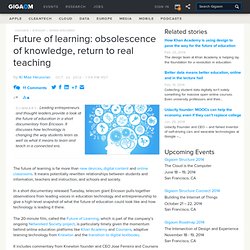
It means potentially rewritten relationships between students and information, teachers and instruction, and schools and society. In a short documentary released Tuesday, telecom giant Ericsson pulls together observations from leading voices in education technology and entrepreneurship to give a high-level snapshot of what the future of education could look like and how technology is leading it there. Better measures of college performance. State lawmakers increasingly want to tie public funding of higher education to colleges' performance.
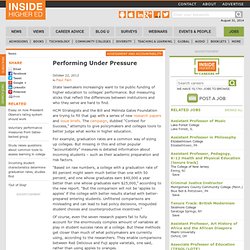
But measuring sticks that reflect the differences between institutions and who they serve are hard to find. HCM Strategists and the Bill and Melinda Gates Foundation are trying to fill that gap with a series of new research papers and issue briefs. The campaign, dubbed “Context for Success,” attempts to give policymakers and colleges tools to better judge what works in higher education.
O gawd, here comes 'Cultural Literacy' again. Journalist Fran Abrams here: is floating - or re-floating - a boat which, she claims, is Michael Gove's favourite reading.
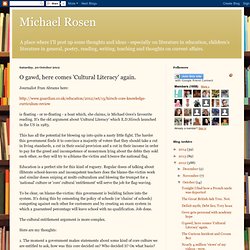
It's the old argument about 'Cultural Literacy' which E.D.Hirsch launched in the US in 1983. This has all the potential for blowing up into quite a nasty little fight. M.guardian.co.uk. What are your views on ED Hirsch? Never heard of him? If so, you're in good company: only a small number of people in the UK have. But you might be well advised to look Hirsch up – his philosophy could be coming to a primary school near you, very soon. Hirschism, if there is such a thing, is spreading fast through the English school system.
Two proposed new primary free schools – the West London free school, backed by journalist Toby Young, and the Pimlico Academy primary – are planning to base their lessons on it. Moreover, a new primary curriculum – due to be implemented in 2014 – has Hirsch at its heart. Transforming the Student Learning Experience: Study: Parents More Influential Than Schools in Academic Success - K-12 Parents and the Public. Lessons in liberation: pedagogy of the oppressed. Sunday, 30 September 2012 08:44 Written by Sean Ledwith “There is no ‘I think’, only a ‘we think’'' – Paolo Freire.
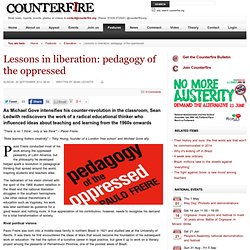
Memory tricks and techniques to boost students' learning. Meeting my new class of year 5s last week, I was delighted to see that the Guinness Book of Records is as popular as ever.
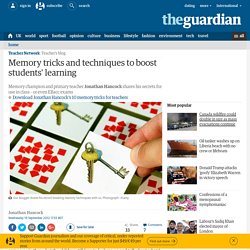
It's a few years now since my name was in there, but the children still love to look me up and talk about what I did, which gives me the perfect opportunity to excite them about their own memory skills. I'll show them a party trick or two, but what I really love is revealing the secrets, and showing the children how they can do some amazing things themselves. I was 16 when I first came across memory techniques; ancient skills and systems for making it easier to learn and remember. Students at the Center. Wolfson_carskadon1998. EmTech Preview: Another Way to Think about Learning. Photos courtesy of Matt Keller.
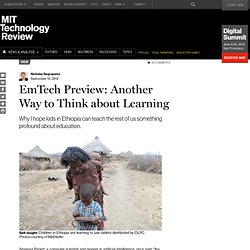
He's not the messiah .. - news. Comment:5 average rating | Comments (2)Last Updated:23 September, 2012Section:news … but for many policymakers he comes close.
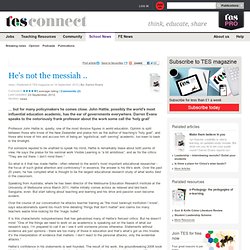
John Hattie, possibly the world’s most influential education academic, has the ear of governments everywhere. Darren Evans speaks to the notoriously frank professor about the work some call the ‘holy grail’ Professor John Hattie is, quietly, one of the most divisive figures in world education. Teaching toddlers to pay attention is the key to academic success. Individuation and Pluralization: The Implications of Multiple Intelligences. Reframing the Mind. Frames of Mind: The Theory of Multiple Intelligences (Basic Books, 1983) Multiple Intelligences: The Theory into Practice (Basic Books, 1993) Intelligence Reframed: Multiple Intelligences for the 21st Century (Basic Books, 1999) By Howard Gardner.
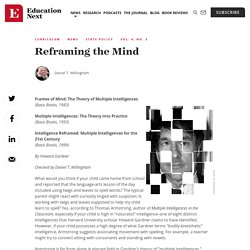
7. What theory of learning will tell me how to teach? “There’s nothing as practical as a good theory” ‘Cryptic, remote, irrelevant and unusable’: it seemed to us, one term in to Teach First, just as it seemed to the much more experienced Tom Bennett, that practical theories in education were hard to come by.
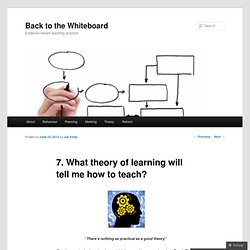
Theories of ZPD (zone of proximal development) and multiple intelligences (from the interpersonal to the intrapersonal) left us with more confusion than clarity. Over our first year, only one theory has had practical applications that improved our teaching. Cognitive science explains how the mind learns, and on that basis recommends how to teach. Its basic tenet is this: minimise working memory overload to maximise long term memory retention.